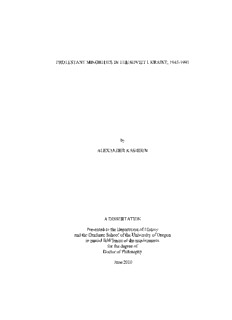
PROTESTANT MINORITIES IN THE SOVIET UKRAINE, 1945-1991 by ALEXANDER KASHIRIN A ... PDF
Preview PROTESTANT MINORITIES IN THE SOVIET UKRAINE, 1945-1991 by ALEXANDER KASHIRIN A ...
PROTESTANTMINORITIES IN THE SOVIETUKRAINE, 1945-1991 by ALEXANDERKASHIRIN A DISSERTATION Presentedto the DepartmentofHistory and the Graduate School ofthe University ofOregon inpartial fulfillmentofthe requirements for the degree of DoctorofPhilosophy June 2010 ii University ofOregon Graduate School Confirmation ofApproval and Acceptance ofDissertation prepared by: Alexander Kashirin Title: "Protestant Minorities in the SovietUkraine, 1945-1991" This dissertationhas been accepted and approved inpartial fulfillment ofthe requirements for the degree in the Department ofHistory by: Julie Hessler, Chairperson, History R Alan Kimball, Member, History Jack Maddex, Member, History William Husband, Member, Not from U of0 Caleb Southworth, Outside Member, Sociology and Richard Linton, Vice President for Research and Graduate Studies/Deanofthe Graduate School for the University ofOregon. June 14,2010 Original approval signatures are on file with the Graduate School and the University ofOregon Libraries. 111 © 2010 AlexanderKashirin IV An Abstract ofthe Dissertationof Alexander Kashirin forthe degree of Doctor ofPhilosophy in the Department ofHistory to betaken June 2010 Title: PROTESTANT MINORITIES IN THE SOVIET UKRAINE, 1945-1991 Approved: Julie Hessler The dissertation focuses onProtestants in the Soviet Ukraine from the end ofthe Second World War to the collapse ofthe USSR. Ithas two major aims. The first is to elucidate the evolution ofSovietpolicy toward Protestant denominations, using archival evidence that was not available to previous students ofthis subject. The second isto reconstruct the internal life ofProtestant congregations as marginalized social groups. The dissertation is thus a case study both ofreligious persecutionunder state-sponsored atheism and ofthe efforts ofindividual believers and their communitiesto survive without compromisingtheir religious principles. The opportunity to function legally came at a costto Protestant communities in Ukraine and elsewhere in the USSR. Inthe 1940s-1980s, Protestant communities lived within atight encirclement ofnumerous governmental restrictions designed to contain and, ultimately, reduce all manifestations ofreligiosity inthe republic both quantitatively and qualitatively. The Soviet state specifically focused on interrupting the generational v continuity ofreligious tradition by driving a wedge between believing parents andtheir children. Aware ofthese technologies ofcontainment and their purpose, Protestants devised avariety ofsurvival strategiesthat allowed them, when possible, to circumventthe stifling effects ofcontainment and ensure the preservation andtransmission ofreligious traditions to the next generation. The dissertation investigates howthe Soviet government exploitedthe state institutions and ecclesiastic structures in its effortto transform communities ofbelievers into malleable societies oftimid and nominal Christians and how the diverse Protestant communities responded to this challenge. Facedwith serious ethical choices-to collaborate with the governmentorresist its persistent interference in the internal affairs oftheircommunities-many Ukrainian Evangelicalsjoinedthe vocal opposition movement that contributedto an increased international pressure on the Soviet government and subsequent evolution ofthe Soviet policy from confrontationto co-existence with religion. The dissertation examines both theoretical and practical aspects ofthe Soviet secularizationproject and advances anumber ofarguments that help account for religion's survival inthe SovietUnion during the 1940s 1980s. VI CURRICULUMVITAE NAME OF AUTHOR: AlexanderKashirin GRADUATE AND UNDERGRADUATE SCHOOLS ATTENDED: University ofOregon EasternNew Mexico University DEGREES AWARDED: DoctorofPhilosophy, ModernRussian History, 2010, University ofOregon MasterofArts, Russian and EastEuropean Studies, 2005, UniversityofOregon BachelorofArts inEnglish, 2002, EasternNew Mexico University AREAS OF SPECIAL INTEREST: SovietPolitical and Social History ModemEuropeanHistory PROFESSIONAL EXPERIENCE: Graduate Teaching Fellow, University ofOregon, 2003-2010 Vll GRANTS, AWARDS AND HONORS: Thomas T. TurnerMemorial Award for Outstanding Achievement and Character, Department ofHistory, University ofOregon, 2008 U.S. Fulbright Fellowshipto Ukraine, "ProtestantMinorities inthe Soviet Ukraine, 1945-1991," September2007-June 2008 Passwith Distinction, Comprehensive Exam for the Degree ofMaster ofArts, University ofOregon, 2005 Cum Laude, BachelorofArts inEnglish, EasternNewMexico University, 2002 Vlll ACKNOWLEDGMENTS I wishto thank my adviser, ProfessorHessler, who workedcloselywithme on this project, as well as Professors Kimball, Maddex, Southworth, and Husbandfor the valuable feedback Ireceivedfrom them. This projectwouldhave been impossible withouta Fulbrightgrantto Ukraine for 2007-2008, whichenabledme to conductthe necessaryarchival research. Iwishto express my sincere appreciationto all parties involved in selectingme as arecipientofthis greathonor-the University ofOregon,the Institute ofInternational Educationandthe Fulbrightrepresentatives inUkraine, especiallythe Director ofthe FulbrightProgram inUkraine, Myron Stachiw. lowe a greatdeal ofgratitudeto all the wonderful people inUkraine whose advice andassistance wereinvaluableto my work's progress-Valerii Vasiliev, who ushered me into the world ofUkrainian archives, employees ofthe TsDAGO and TsDAVO archives inKyiv, the academic staffofthe Department ofReligious Studies atthe G. SkovorodaInstitute of Philosophyin Kyiv, and my generous hosts, the Kyiv SeventhDayAdventistresidents IvanFedorovichand MartaKhimenets, for sharingtheirhome withme and connecting me witha numberofprominentUkrainianProtestants Iwishedto interview. I also want to acknowledge my wife, Wanda, whose patience, understanding andundivided support ofmy academic pursuits were indispensible to the successful completionofthis project. Finally, Iwantto thank my faithful dog, Fifi, for the love andcompanionship she lavishedupon me so unconditionally overthe years ofmy graduate experience. IX Tothe memory ofmy Mother, Nadezhda, and Father, Yurii x TABLE OF CONTENTS Chapter Page I. INTRODUCTION 1 II. STATE INSTITUTIONS: THE COUNCIL FOR THE AFFAIRS OF RELIGIOUS CULTS 28 1. The CARC's Functions and Prerogatives.......................................................... 31 2. The CARC Relationship withthe MGB/KGB and LawEnforcement Agencies............................................................................................................. 61 3. The ImpactofKhrushchev's Empowerment ofthe LocalAuthorities onthe CARC 73 4. The CARC's Role as Ombudsmanfor Believers 82 5. Conclusion 88 III. ECCLESIASTICAL INSTITUTIONS: THE VSEKhB AND THEVSASD ...... 95 1. The Formationand Aims ofthe VSEKhB 102 2. The VSEKhB and the Pentecostals: A Failed Union 135 3. The ForeignRelations Role ofthe VSEKhB 163 4. TheVSEKhB as Enforcer 188 5. The ContrastingExample ofVSASD 199 IV. PROTESTANTS AJ\lD LOCAL AUTHORITIES 224 1. Protestants as Victims ofPrejudice and GeneralBrutalization ofSoviet Society 226 2. StateBond Drives as Pretextsto HarassProtestants 237
Description: